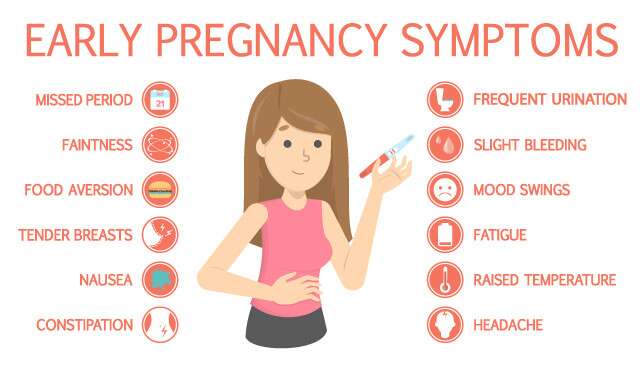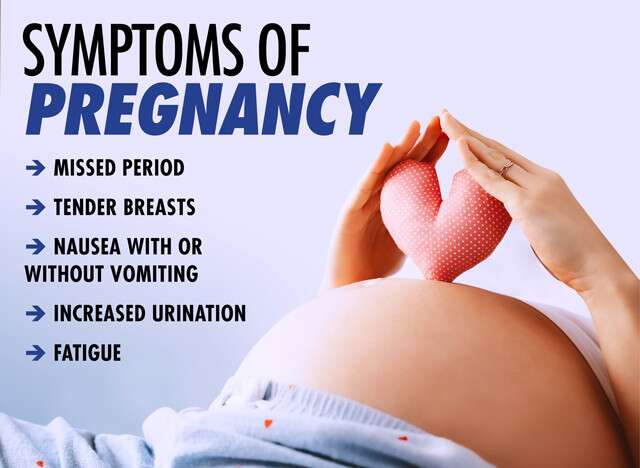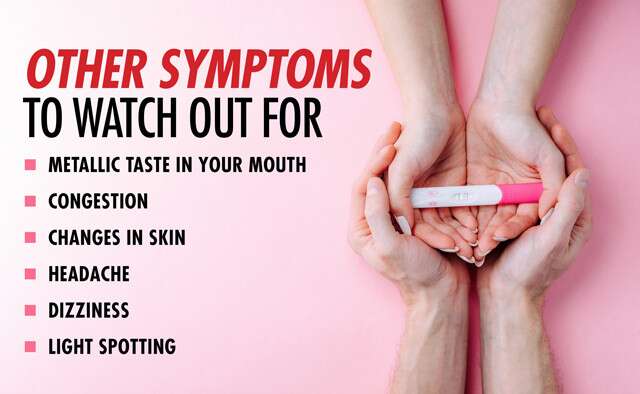
If you are noticing a lot of changes in your body and suspecting its pregnancy, you might be right (or wrong!). But there’s nothing to worry about. Here’s a list of symptoms of pregnancy that will help you understand your body better. Pregnancy is undoubtedly the most delightful news and experience a couple can have in their span of life. Giving birth to your child and making something of your own brings with it its own joy and happiness. However, it can also lead to untimely stress or worry if it isn't planned.
Whether you are planning or not, keep an eye out for these visible signs and symptoms that are most common in early pregnancies. Some of them are clear signs, while some could cloud your usual health issues. In any case, if you notice discrepancies in your menstrual cycle, it is always safe to first consult with your gynaecologist immediately.
What Happens First?
Symptoms Of Pregnancy
Other Symptoms Of Pregnancy
Are You Really Pregnant?
Miscarriages During Pregnancy
How To Care While Expecting
Frequently Asked Questions (FAQs)
Conclusion
Sources
What Happens First?
In most cases, the first sign of pregnancy is a missed period. Pregnancy tests will show positive by this time. Also, you may experience at least the other early pregnancy symptoms (1) which include tiredness, bloating, peeing more than usual, nausea, mood swings, and tender or swollen breasts.Tip: If you have missed a period and are unsure of being pregnant, taking a quick pregnancy test will help you.
Here are the most common symptoms of pregnancy (2) that you can tell:
Symptoms Of Pregnancy

1. Missed Period
Women usually have a 28-day menstrual cycle which means there are about 5-6 days every month as a window when you can get pregnant. You’re the most fertile at the time of ovulation which is 12-14 days before your period. It might be helpful for you to keep track of your cycle and the time you engaged in sexual intercourse. However, otherwise, a missed period is a big signal that you need to check if you are pregnant.Learn more about Ovulation Tracking For Planning Pregnancy here
2. Bloating
Pregnancy is not easy by any means. Your body undergoes many biological and physical changes to provide a safe and nutritious incubation for the child. Thus, you might experience bloating or uneasiness due to higher levels of progesterone that slow down your digestive system. This condition makes your stomach looks puffier and fuller than usual. If you have missed your period and you experience bloating, then it’s time for you to keep an eager eye out on that pregnancy stick!3. Frequent Urination
When the baby presses on the bladder, the pressure increases, and so does the need to urinate. These breaks can start early. The extra blood flow to the kidney along with the swelling uterus, causes frequent urination. That does not, however, mean you cut back on your fluid intake. Keep that consistent, and unless there’s a hint of burning sensation, urgency or any kind of infection, there’s nothing to worry about.4. Mood Swings
Well, it’s not PMS, but it can get that intense. This happens due to the increasing levels of hCG hormones which also cause fatigue and prone to moodiness. So the next time you find yourself enraged because you have nothing decent to watch or if your gardener took the day off, don’t worry. Give yourself some time to cool off and have something you crave.Learn how to cope with pregnancy mood swings here.
5. Swollen Breasts
Changes in breasts are the earliest signs you can spot, as early as two weeks after conception. Hormonal changes turn your breasts tender and sore. Sometimes, you may also find them grow fuller and heavier. However, it is not uncommon as they develop due to increased blood flow and the growing needs of the baby. You can wear a supportive, wire-free bra, loose-fitting clothes or maternity clothes. A regular warm shower might also help soothe the soreness.6. Cramping
Mild spotting and vaginal bleeding (3), also known as implantation bleeding, are early signs of pregnancy. This happens when the fertilised egg attaches to the lining of the uterus after two weeks of fertilisation. According to a study by the Department of Epidemiology at the University of North Carolina, one-fourth of participants out of a study of 1207 experienced bleeding, but only 8 percent reported heavy bleeding. Some women also experience cramping in their lower abdomen early in their pregnancy.7. Nausea With Or Without Vomiting
Nausea (4), with or without vomiting, is also called morning sickness. It is common during the first trimester of pregnancy, improving later on. Nausea may be brought on by certain odours or eating certain foods.Tip: See your doctor if you have dark-coloured urine, can't keep liquids down, feel your heart race, or feel dizzy when you stand up.
Know about the foods that will help relieve morning sickness here
8. Light Spotting
If you are pregnant, light spotting can take place around the time of your next period or about 10-14 days post-conception. This is known as implantation bleeding and is one of the first signs of pregnancy.Tip: Implantation bleeding occurs when the fertilised egg attaches itself to the inner lining of the uterus.
9. Food Cravings
Probably the best part (or worst) is the fact that you can eat anything and everything (except a few) of your choosing. Experts say that food cravings are triggered by hormonal changes in pregnancy. You are likely to experience food cravings from as early as the first week after conception, but women commonly develop them towards the later part of the first trimester.One day you might crave a pickled cucumber and on the other, you might have a rush for sauerkraut. Nevertheless, besides a few vegetables that can pose a risk for miscarriages, you can indulge yourself in whatever you like.
Tip: Food cravings are bound to peak in the second trimester, declining in the third trimester.
10. Fatigue
If you are pregnant you will feel more exhausted than usual. Your body is starting to take care of two bodies instead of one. Therefore, even your normal routinely day will start exhausting you. Drowsiness, not wanting to get out of bed or wanting to hit the bed too soon is common.11. Weight Gain
If you’re suddenly gaining weight without any reason, you could be pregnant. Weight gain comes from a lot of reasons but if you don’t find any major reason for your weight gain, you need a trip to the doctor. Obviously the little body growing inside you adds on the kilos.12. Raised Temperature
If your body is experiencing a sudden rise in temperature without any reason, it might be a symptom of pregnancy. The body raises its temperature to fight any foreign intruders. A baby growing inside you triggers this defence.Other Symptoms Of Pregnancy

13. Metallic Taste In Your Mouth
Pregnancy brings about changes in you hormones. This could change the taste in your mouth and leave a sour or metallic taste in. These hormones could also make you dislike your favourite foods and make you prefer strange food combinations.14. Congestion
If you are pregnant your body will make extra fluids. This could cause swelling and mucus lining in different parts of your body including your nasal passage. Mucus in nasal passage or chest will cause congestion or stuffing.15. Acne or Skin Changes
Symptoms of Pregnancy can include acne, brown patches or dark spots on your body and face. During this time the body produces a lot of oil and goes through hormonal changes. These changes in the body can cause acne and other skin changes.16. Headaches
Pregnancy can change your hormones, mess up your sleep schedule, increase stress and bring in many changes in your body. This can trigger headaches. Getting frequent headaches can be common among symptoms of pregnancy.17. Dizziness
Getting too dizzy or too often can be a sign of pregnancy. Taking care of another body puts pressure on your heart and a growing uterus might put pressure on major vein or two. These changes cause dizziness.18. Light Spotting
Light spotting or vaginal discharge could be one of the symptoms of pregnancy. The changes in your uterus and growing uterus can lead to the wall of uterus discharging blood.Are You Really Pregnant?
Interestingly, the symptoms of early pregnancy and premenstrual syndrome (PMS) can be quite similar. So, if you're feeling nauseous, experiencing fatigue, or seeing any early pregnancy symptoms, take a pregnancy test to confirm.Tip: Wait to take a pregnancy test until a week after your missed period.
Know how to spot the difference between Pregnancy and PMS here
Miscarriages During Pregnancy
A miscarriage indicates the loss of a fetus (5) before the 20th week of pregnancy. Factors causing miscarriage vary from age (women above 35 years of age are at a higher risk of having a miscarriage), previous histories of miscarriages, smoking or alcohol addictions, cervical problems and so on.Dr. Singh lists out factors that can cause immediate miscarriage:
A miscarriage is mostly like to occur within the first 3 months of pregnancy, before 20 weeks gestation. Only 1 percent of miscarriages occur after 20 weeks of gestation these are termed late miscarriages. Miscarriages are also caused by a variety of unknown and known factors.- Genetic or hereditary factors: Around 50 percent of all miscarriages may be attributed to the genetic disposition of the mother-to-be.
- Immunological factors: Some women have antibodies in their blood, which invade their own cells. Some of these antibodies invade the placenta or promote the formation of a blood clot, which affects fetal development and eventually causes a miscarriage.
- Anatomical Factors: Some women have septum or walls in their wombs, and some may develop fibroids that may hinder the required space for fetal development in the womb.
- Infection: Infection spread due to bacteria, viruses, or any other parasite may also lead to miscarriage, though such cases are very rare.
- Hormonal imbalance: Certain hormones help in flourishing the placenta by providing the ambience and if there is an imbalance, this may lead to miscarriage as well. It is thus advised for women with complications in their menses (irregular periods, Endometriosis, PCOD, etc.) to be extra precautions as their vulnerability among them is high.
Dr. Singh shares that it is of utmost importance to immediately connect with your gynaecologist to analyze the situation. Miscarriages may be due to an underlying cause of any reproductive ailment which may or may not be a serious condition. As this process cannot be reversed or stopped, supportive care can ensure the scope of improvement for the mother.
How To Care While Expecting
Dr. Anjana Singh, gynaecologist and director of obstetrics at Fortis Hospital, Noida, lists down how to care for yourself while expecting:
- Small and frequent meals are the norm. Avoid eating on a full stomach.
- A balanced diet including carbohydrates, proteins and minerals, is essential and shouldn’t be avoided.
- Pregnant ladies should drink at least 3-4 litres of liquids in a day, which includes water, coconut water, juices, lassi, etc.
- Aerated drinks should be avoided, and caffeine intake should be restricted to only two cups of tea or coffee in 24 hours.
- Although essential, avoid too many carbs like sweet potatoes and rice. Fruits like pineapples and papaya should be avoided as they contain the enzymes papain – which is detrimental and can cause miscarriages.
- Exercise is very important for the well-being of a pregnant lady. A walk after dinner is imperative.
Frequently Asked Questions (FAQs)
Q. Am I pregnant?
A. The most reliable and foremost sign of pregnancy is a missed period. Keep track of your ovulation cycles. If need be, take a stick test to preliminarily rule out the confusion.Q. When do cravings start?
A. Every woman experiences food cravings at different intervals. However, usually, it is in the first trimester that a pregnant woman ideally starts experiencing food cravings. Some may crave fatty chips, some may crave fried food or some might even feel like having meat. Although it is entirely alright to give in to these cravings, try to consume as many healthy foods as possible.Q. How to stay fit during pregnancy?
A. Before starting to follow a fitness routine, consult with your obstetrician and gynaecologist as to what suits you based on your pregnancy type. The safer options are to do yoga asanas, walking, breathing exercises, meditation and aerobic and muscle-strengthening exercises.Q. Can you feel pregnant after 2 days?
A. As mentioned, the symptoms of early pregnancy and PMS can be similar. Also, pregnancy symptoms don't often occur until after you've missed a period. So, if you experience symptoms a day or two after having sex, they are not usually a sign of pregnancy.Q. How does your lower stomach feel in early pregnancy?
A. At the end of the first trimester, your baby is still tiny, weighing under 30 grams. As such, your belly will not feel any different, probably just a little bigger like when you are bloated.Q. Is your stomach hard or soft in early pregnancy?
A. Your belly undergoes a lot of changes during pregnancy, depending on the stage of the pregnancy. During the first trimester, there might not be much of a difference. Your belly will be just a little bigger, like when you are bloated and most likely soft.Q. How early do pregnancy symptoms start?
A. Pregnancy symptoms can start as early as two weeks after conception. But the symptoms of pregnancy and duration can be different for everyone.Q. What symptoms do you have at 1 week pregnant?
A. At one week pregnant, you may not have any symptoms. Some women experience fatigue, tender breasts, constipation, bloating and headaches. Anyway, it's best to wait a week after missing your period and taking a test to be sure.Q. How to know if I’m Pregnant without a test?
A. There are several signs and symptoms of pregnancy that you can look out for, such as a missed period, frequent urination, nausea and vomiting, tender or swollen breasts, fatigue, and changes in food cravings or aversions. However, the only way to definitively know if you are pregnant is to take a pregnancy test.Q. How can I make sure I’m not pregnant?
A. The only way to be sure you are not pregnant is to take a pregnancy test. If the test is negative, then you can be confident that you are not pregnant. Additionally, always practice safe sex methods and use protection to reduce any risks of being pregnant.Q. Could I have the symptoms of early pregnancy and not be pregnant?
A. All the symptoms of being pregnant could be because of other illnesses and conditions also. You can have the symptoms of pregnancy but not be pregnant. However, always do a test to be hundred per cent sure.scars.
Conclusion
Symptoms of pregnancy do not guarantee a pregnancy. Always rely on pregnancy tests to be absolutely sure. For different women, pregnancy can mean different things. Therefore, always practice safe sex and study up on birth control and lifestyle changes if you don’t want to get pregnant. For moms-to-be, remember to prioritize yourself and your baby completely during this time. Here’s to a healthy body after all!Sources
- Examining to what extent pregnancy-related physical symptoms worry women in the first trimester of pregnancy: a cross-sectional study in general practice.
https://www.ncbi.nlm.nih.gov/pmc/articles/PMC6995862/ - A prospective study of the onset of symptoms of pregnancy.
https://pubmed.ncbi.nlm.nih.gov/12160915/ - Vaginal bleeding and nausea in early pregnancy as predictors of clinical pregnancy loss.
https://www.ncbi.nlm.nih.gov/pmc/articles/PMC7994023/ - Interventions for nausea and vomiting in early pregnancy.
https://www.ncbi.nlm.nih.gov/pmc/articles/PMC7196889/ - Signs and Symptoms of Early Pregnancy Loss
https://www.ncbi.nlm.nih.gov/pmc/articles/PMC5933199/
Next Story